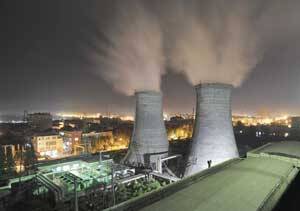In his message for the World Day of Peace on Jan. 1, 2010, Pope Benedict XVI issued a global call to action: “If you want to cultivate peace, protect creation.”
In this annual address from the Vatican, Pope Benedict said responding to the current ecological crisis was every person’s responsibility. Government policies, the activity of multinational corporations and the day-to-day behavior of individuals all have an impact on the environment, the pope said. While the future of the world hangs in the balance because of what people are doing today, the negative effects of pollution and environmental exploitation already can be seen, he said. “Can we remain indifferent before the problems associated with such realities as climate change, desertification, the deterioration and loss of productivity in vast agricultural areas, the pollution of rivers and aquifers, the loss of biodiversity, the increase of natural catastrophes and the deforestation of equatorial and tropical regions?” Pope Benedict asked.
Pope Benedict noted that threats to global peace arise just as often from misuse of the earth’s resources as from man’s inhumanity to man. “Can we disregard the growing phenomenon of ‘environmental refugees,’ people who are forced by the degradation of their natural habitat to forsake it? Can we remain impassive in the face of actual and potential conflicts involving access to natural resources?”
The church’s commitment to protecting the environment flows from a religious duty “to protect earth, water and air as gifts of God the creator, meant for everyone, and above all to save mankind from the danger of self-destruction,” Pope Benedict said. He added that responding appropriately to the ecological crisis of our times would help address the personal spiritual and moral crises that propel overconsumption and indifference. “It is becoming more and more evident that the issue of environmental degradation challenges us to examine our lifestyle and the prevailing models of consumption and production, which are often unsustainable from a social, environmental and even economic point of view,” the pope said.
Pope Benedict challenged global leaders to re-evaluate long-held beliefs about the role of economic development. He called for “a profound, long-term review of our model of development, one which would take into consideration the meaning of the economy and its goals with an eye to correcting its malfunctions and misapplications.” Pope Benedict seemed to appreciate the global environmental crisis as an opportunity to promote solidarity and address industrialized society’s sinful consumption compulsion. “The ecological problem must be dealt with not only because of the chilling prospects of environmental degradation on the horizon; the real motivation must be the quest for authentic worldwide solidarity inspired by the values of charity, justice and the common good,” Pope Benedict said.
The pope also noted the need for an “inter-generational solidarity.” The environmental crisis, he said, must be met with a universal sense of responsibility not only to people living in other parts of the world but also to generations who have not yet been born. “Natural resources should be used in such a way that immediate benefits do not have a negative impact on living creatures, human and not, present and future; that the protection of private property does not conflict with the universal destination of goods; that human activity does not compromise the fruitfulness of the earth, for the benefit of people now and in the future.”








